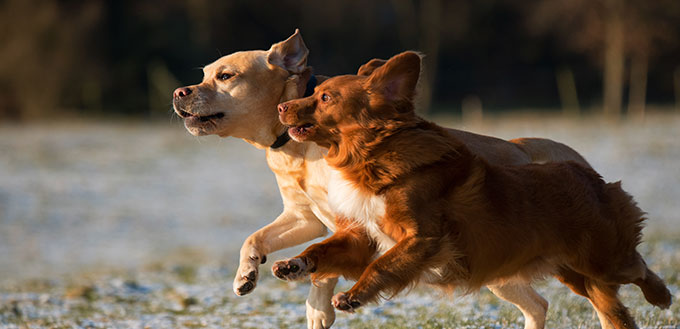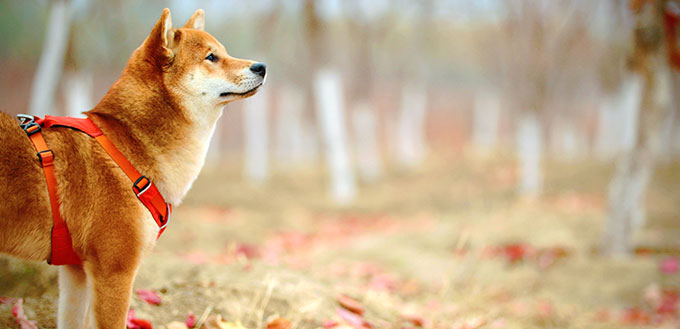Have a pup who thinks eating rocks is just a standard afternoon activity? This kind of behavior in dogs can be a sign of a number of issues, including health problems that could be hiding away in your dog’s body. Canines who eat non-food items are essentially giving you a giant red flag of a sign to tell you something is wrong. Let’s dive in and explore the world of dogs chewing rocks and why they do it.
Why Do Dogs Eat Rocks?
When your dog eats rocks, they are eating non-food items that can be extremely damaging to their internal system. Even swallowing rocks of a small size can cause intestinal blockages and other health issues that will require a vet and possibly even require surgery.
If your dog eats rocks they could just be chewing rocks for the various textures. Some canines like the rough feel and will drop them soon after they’ve rolled the rock around in their mouth a couple of times. But if your dog is swallowing rocks, that’s a problem.

Reasons Your Dog is Eating Rocks
1. Your Dog is Being Inquisitive
This happens a lot with younger pups and dogs that didn’t get out much before they came to live with you in your home. Consider your dog chewing rocks as something similar to a toddler who puts absolutely everything in their mouth. Just like a toddler, your dog is exploring the world. They don’t understand that what they’re doing isn’t exactly a safe way of committing to that world exploring behavior, but that’s why you’re around – to teach them not to chew rocks.
2. Your Pup is Bored
Though boredom isn’t considered to be a cause for behavioral concerns, rock-eating behaviors certainly are. Your dog shouldn’t be rock chewing to stop themselves from being bored when they’re at home. Rock chewing could be a way that your dog is getting some much-needed mental stimulation, which means that you need to have a good look at their environment and do your best to enrich it as soon as possible.
3. Your Dog Has Negative Feelings
When your dog’s desire to start ingesting rocks is the direct result of their emotional distress, there’s something very wrong. Dogs who are often stressed or anxious will give in to strange behaviors that you wouldn’t usually see from them. Eating strange things like rocks and other non-food items is a type of displacement behavior where your dog does something odd to help calm their negative emotions.
Basically, your dog might be eating rocks because they’re sad. But they aren’t just a little upset. Your dog is depressed or upset enough to try to physically cheer themselves up.
4. Health Issues
Unknown or underlying health problems can also cause your dog to exhibit strange behavior like becoming a rock eater. Dogs that have a medical issue seek comfort where they can find it and will often eat strange things because they will do anything to alleviate the pain they’re in.
The health issue may not be something serious. Dogs will eat rocks for something as simple as an upset stomach. But in eating those rocks, your dog then allows all kinds of bacteria to enter their digestive tract, which can cause issues on top of the problems your dog was already having.
There are even health conditions where eating non-food items can point towards serious problems. Pica, for example, is a health condition where a dog will eat non-food items for seemingly no reason. A dog with Pica could then go on to develop more serious problems, as well as anxiety or even Obsessive Compulsive Disorder (OCD).
Pups that have nutritional deficiencies have also been known to eat rocks because their body recognizes the need for certain minerals or vitamins that they aren’t getting from their dog food.
Why is My Puppy Eating Rocks?
In the event that you have a dog, specifically a puppy, who is eating rocks, many of the reasons they are doing this will be the same as other dogs. Puppies, in particular, are very curious about the world. If a dog is an inquisitive toddler, your puppy is an overactive inquisitive toddler.
If your dog or puppy shows the following symptoms, you need to seek advice from your vet:
- Eating various non-food items in addition to rocks
- Frequent urination
- Excessive thirst
- Vomiting
- Diarrhea
- Seizures
- Bloody or black stool
How to Stop Your Dog from Eating Rocks
1. Teach Your Dog the “Leave it” Command
“Leave it” is one of the most powerful commands that you can teach your dog. Other animals don’t respond as well to verbal commands, but a dog who has been trained to understand “leave it” will drop or turn away from whatever has their attention.
“Leave it” is often used when training canines to be more obedient, and has great applications for dogs who enjoy going on long walks in the great outdoors. You’ll be able to better control your pup when they’re on a leash and stop them from eating any foreign bodies they’ve found on the ground.
2. Buy Your Dog Better Quality Chew Toys
Pups that chew large rocks through boredom often don’t have an enriched home environment. They use rocks as entertainment because there aren’t any suitable things in their home for them to chew on.
If you have a furry friend that has become a rock chewer, they will benefit from having a range of interactive toys and chew toys to play with. Their current chew toys may not be giving them the physical stimulation that they need to thrive and get enough exercise at home.
3. Check Your Dog’s Diet for Nutritional Deficiency
Dogs sometimes chew rocks when the nutritional value of their dog food isn’t meeting their dietary needs. Cheaper brands of dog food are often stuffed full of filler ingredients that can cause a serious problem in your dog’s diet. Check the ingredients of the dog food your pup is eating against the daily recommended amounts for a pup of their size.
For example, it’s recommended to eat food that contains the full range of vitamins to remain healthy. That means you need a dog food that is rich in Vitamin A, B, C, E, D, and K. Your canine friend needs to get these vitamins in their daily diet, whether they come from their kibble, wet pet food, treats, or other dog food products that contain them.
But it’s not just about vitamins. There are also several minerals that canines seek in their diet. Many minerals carry earthy tastes, which could be why a dog chews rocks on occasion. Minerals can be found in various vegetables, fruit, whole grains, meat, rice, and seafood products. Your pup needs to be getting enough food and the right kind of food to live a healthy lifestyle. Or they’ll just continue to eat things they shouldn’t be eating and cause medical problems for themselves.
What Kind of Food Should I Feed My Dog if He’s Eating Rocks?
Finding more rocks in your dog’s mouth than you’d like to? Your pup may need a change in diet. As a dog owner, it’s your responsibility to feed your canine a balanced diet that will keep them away from unnecessary emergency vet visits. Look for dog food that has a range of vitamins and minerals, and is made with whole, healthy food.
Stay away from any doggy food brand that uses filler ingredients like these:
- Chicken meal (or other meat meals)
- Meat by-products
- Food dyes
- Artificial flavoring
- Rendered fat
- Corn gluten
- Wheat gluten
- BHA (Butylated Hydroxyanisole)
- BHT (Butylated Hydroxytoluene)
- Ethoxyquin

What Happens When a Dog Eats a Rock?
When a rock tries to pass through the digestive system of a pup it can cause blockages that most dogs cannot deal with by themselves. These blockages will require a treatment plan which typically includes surgery and a lengthy recovery time, and the bacterial on the rock has the potential to give your pup intestinal parasites, as well as other issues.
You may get lucky and be able to avoid sending your pup into emergency surgery by having your vet induce vomiting in your furry friend. Your pup could also vomit up smaller rocks by themselves, but this doesn’t always work and it’s risky to use as your only option.
Small rocks can pass through your pup’s system without causing problems, but it’s a gamble and is extremely stressful. While the rock is in there, it could cause all kinds of problems or tears on its way out.
Rocks are also hard on dogs’ teeth and your pup may end up needing dental surgery to fix any damage caused by prolonged rock eating.
What to do When Your Dog Has Eaten a Rock
No matter what size of rock your pup ate, if you know they’ve definitely eaten one, take your pup to a veterinarian immediately. Eating things like rocks can have negative impacts on your dog’s digestive system. Rocks can be sharp, covered in bacteria, and they will often cause issues as they travel through your dog’s gut.
Many dogs have problems when they eat seeds, imagine how many issues eating rocks can cause in your pup. Best to be safe and have a vet check out your dog. It’s the responsibility of dog owners to have their dogs examined when these situations occur.
FAQs:
Q: Why does my dog eat rocks?
A: Your pup is either eating rocks because of a behavioral issue or because their food isn’t adequate. Add more chew toys to your home, try changing up their dog food, and attempt to teach your pup better obedience to stop them from eating things they shouldn’t be eating.
Q: Should I stop my dog when he’s rock-eating?
A: Always stop fluffy friends when you see them eating any rocks, no matter how small the rocks seem. Dogs that don’t know any verbal commands can be more difficult to stop, but you shouldn’t let your pup continue chewing in stones from your garden because they can be extremely damaging.





